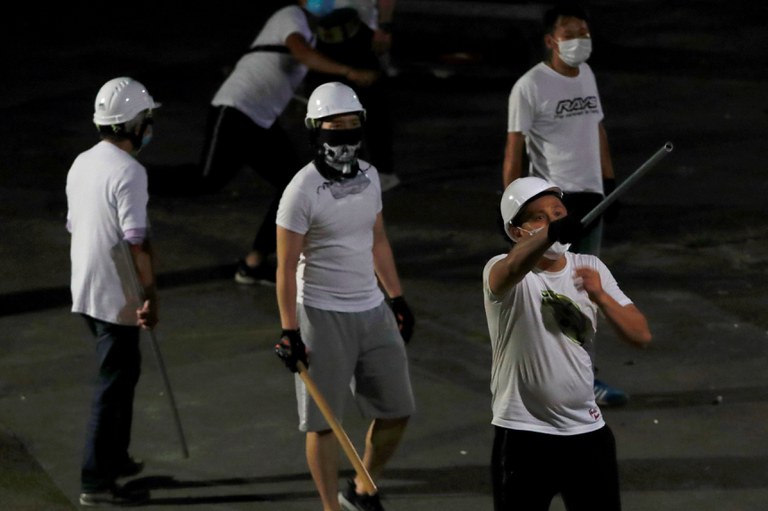Two more Uyghurs detained in Saudi Arabia face risk of deportation to China
Two more Uyghurs — a mother and her daughter — are in danger of being deported from Saudi Arabia back to China, where they could face severe punishment at the hands of authorities there, an international human rights group said. Police detained Buhalchem (in Chinese, Buheliqiemu) Abula and her 13-year-old daughter near the holy city of Mecca on March 31 and told them that they faced deportation to China along with two Uyghur men already held, according to a message received by Abula’s friends, London-based Amnesty International said in a statement on Monday. One of the men held, Nurmemet Rozi (Nuermaimaiti Ruze), is Abula’s former husband and father of the 13-year who are now also being held. Rozi and Hamidulla Wali (Aimidoula Waili), a religious scholar, have been detained without charge in Saudi Arabia since November 2020. The two men traveled to Saudi Arabia from Turkey on a religious pilgrimage to Mecca and were arrested, though authorities allegedly never told them why they were being held, RFA reported in March. Family members of the two men told Amnesty that the pair had been transferred from Jeddah to Riyadh, Saudi Arabia’s capital, in a move they believed was a precursor to extradition. “Buhalchem and her daughter were detained in the evening of March 31,” Wali’s daughter, Nuriman Hamdulla, told RFA. “I spoke to her as she and her daughter were taken away. They were given no reason for the detention. We’re not sure where they’re detained now.” “They’re innocent,” she said. “They must be detained at the request of the Chinese government because they didn’t break any law.” Hamdulla also said that she had not received a response from the Saudi authorities about whether her father and Rozi had been sent back to China. “Deporting these four people — including a child — to China, where Uyghurs and other ethnic minorities are facing a horrific campaign of mass internment, persecution and torture, would be an outrageous violation of international law,” said Lynn Maalouf, Amnesty’s deputy regional director for the Middle East and North Africa. “With time seemingly running out to save the four Uyghurs from this catastrophic extradition, it is crucial that other governments with diplomatic ties to Saudi Arabia step in now to urge the Riyadh authorities to uphold their obligations and stop the deportations,” she said. Rights groups, the United Nations and some Western countries have denounced China’s persecution of Uyghurs and other Turkic minorities in Xinjiang. China is believed to have detained about 1.8 million people in a network of internment camps across the region, with survivors reporting forced labor, torture and rape. Call for international action Under the international law principle of nonrefoulement and as a state party to the U.N. Convention against Torture, Saudi Arabia is prohibited from returning people to countries where they would face torture, cruel punishment, persecution or other serious harm. Alkan Akad, Amnesty’s China researcher, told RFA that the Uyghurs would likely face arbitrary detention and torture if they were deported to China. “They would be taken to internment camps, and the daughter also would be forcibly separated from her family,” he said. “And so, we call on the Saudi government to release them immediately unless there is international recognizable crime they are charged with.” An official at the office of the Permanent Mission of Saudi Arabia to the United Nations in New York told RFA that the country’s “policy on the Uyghur issue is very clear in all our statements,” but said that she was not responsible for the issue. Amnesty also called on the international community, especially the United States and the United Kingdom as strategic allies of Saudi Arabia, to take action to prevent the illegal extradition of the Uyghurs to China. The call came after two U.N. experts, Fernand de Varennes and Ahmed Shaheed, urged Saudi Arabia on April 1 to abide by the nation’s nonrefoulement obligations and to refrain from extraditing Rozi and Wali. “We are alarmed by the arrest of two Uyghur men in Saudi Arabia, since November 2020, and their continuous detention without proper legal justification or implementation of fundamental safeguards, reportedly on the basis of an extradition request made by China,” the experts said in a statement. “Detention should remain an exceptional measure subject to an individual assessment and regular judicial review, otherwise Saudi Arabia would be depriving the two men of their fundamental rights provided for under national and international law,” they said. De Varennes and Shaheed also requested that Saudi authorities immediately allow the two men to contact their families. The Saudi government has publicly supported China’s antiterrorism measures in what rights activists have said is a tacit approval of the crackdown on predominantly Muslim Uyghurs and other Turkic minorities in Xinjiang. Saudi authorities have returned other Uyghurs back to China after they traveled to the country for work or to make a pilgrimage to Mecca. “We call on the Saudi authorities to immediately release the detained Uyghurs and refrain from deporting them to China, a country that’s committing active genocide against Uyghur Muslims,” said Dolkun Isa, president of the World Uyghur Congress in Germany. “We urge the Saudi government to allow the Uyghurs to leave for a third safe country.” Translated by RFA’s Uyghur Service. Written in English by Roseanne Gerin.



